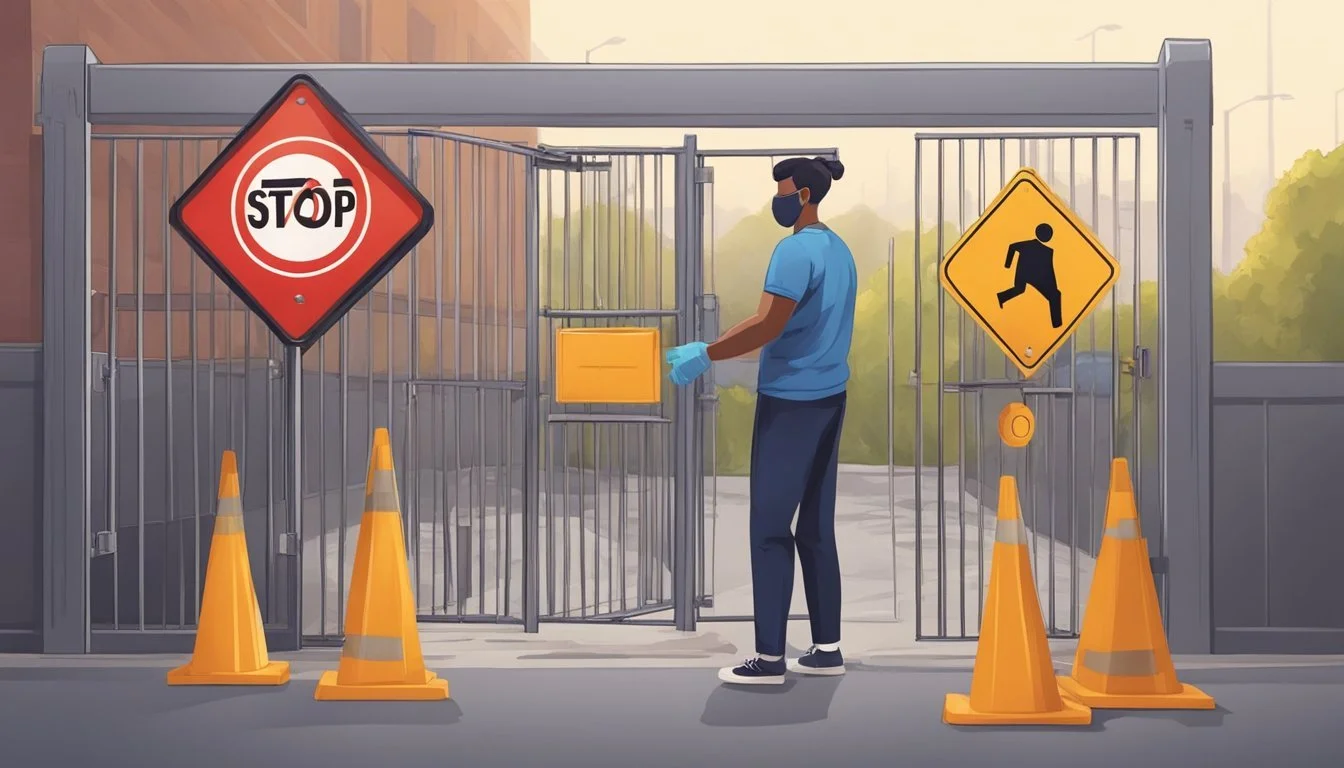How to Deal with Toxic People: Strategies for Maintaining Your Well-Being
Toxic people can have a significant impact on our mental health and relationships. These individuals often leave us feeling drained, anxious, or bad about ourselves after interactions. They may constantly shift blame, disrespect boundaries, or attempt to control those around them. Recognizing toxic behaviors and implementing effective strategies to deal with them is crucial for protecting our wellbeing.
Dealing with toxic people requires a combination of self-awareness and practical techniques. Setting clear boundaries is essential, as is learning to disengage from unproductive interactions. It's important to remember that we cannot change others, but we can control our own responses and choices. Seeking support from trusted friends, family members, or professionals can provide valuable perspective and emotional reinforcement.
While it may be tempting to try to please toxic individuals or get caught up in their reality, these approaches rarely lead to positive outcomes. Instead, focusing on our own growth, maintaining healthy relationships with supportive people, and prioritizing self-care can help create resilience against toxic influences. By developing these skills, it becomes possible to navigate challenging interpersonal dynamics more effectively.
Recognizing Toxic Behavior
Toxic behavior can manifest in various ways, often causing distress and negative impacts on relationships. Recognizing these patterns is crucial for protecting one's well-being and setting appropriate boundaries.
Identifying Signs of Toxicity
Toxic individuals often display consistent patterns of harmful behavior. They may frequently criticize or belittle others, making them feel inferior or worthless. These people tend to be overly controlling, attempting to dictate others' actions or decisions.
Constant negativity is another red flag. Toxic people may complain excessively or focus on problems without seeking solutions. They might also engage in gossip or spread rumors, damaging relationships and reputations.
Emotional manipulation is a common tactic. This can include guilt-tripping, playing the victim, or using emotional outbursts to get their way. Toxic individuals may also exhibit unpredictable mood swings, creating a tense and unstable environment.
Understanding Manipulation Tactics
Toxic people often employ sophisticated manipulation techniques to maintain control. Gaslighting is a prime example, where they distort reality to make others doubt their perceptions or memories.
Another tactic is projection, where the toxic person accuses others of behaviors they themselves exhibit. This deflects attention from their own faults and creates confusion.
Toxic individuals may use love bombing, showering someone with excessive affection to gain trust, only to withdraw it later as a form of control. They might also employ the silent treatment, withholding communication as punishment.
Guilt is a powerful tool in their arsenal. They may make others feel responsible for their happiness or use past favors to manipulate future behavior.
Differentiating Between Toxicity and Occasional Negative Behavior
It's important to distinguish persistent toxic behavior from occasional lapses in judgment. Everyone has bad days or moments of weakness, but toxic patterns are consistent and harmful over time.
Toxic behavior typically lacks accountability. When confronted, toxic individuals often make excuses, shift blame, or refuse to acknowledge their actions. They rarely show genuine remorse or make efforts to change.
In contrast, people exhibiting occasional negative behavior usually recognize their mistakes and try to make amends. They show empathy and are willing to work on improving their actions.
Context matters when assessing behavior. Consider the frequency, intensity, and impact of actions. Occasional irritability or moodiness doesn't necessarily indicate toxicity, but persistent patterns that harm others do.
The Impact of Toxic People
Toxic individuals can have profound effects on those around them. Their behaviors and attitudes often lead to negative consequences for others' well-being, mental health, and relationships.
Effects on Personal Well-Being
Toxic people can significantly diminish one's sense of well-being. Their constant criticism and negativity may cause others to feel bad about themselves. This can lead to decreased self-esteem and confidence.
Interactions with toxic individuals often leave others feeling drained and exhausted. The emotional energy required to deal with their behavior can be overwhelming.
Stress levels tend to increase when dealing with toxic people. This chronic stress can manifest in physical symptoms like headaches, fatigue, and digestibility issues.
Consequences for Mental Health
Exposure to toxic behavior can have serious implications for mental health. Anxiety and depression may develop or worsen due to prolonged contact with toxic individuals.
Toxic people can create a sense of confusion and self-doubt in others. This can lead to difficulty in decision-making and trusting one's own judgment.
The constant negativity from toxic individuals may result in a pessimistic outlook on life. This can impact overall happiness and life satisfaction.
Strains in Relationships and Social Dynamics
Toxic people often create tension in social settings. Their behavior can disrupt group dynamics and make others uncomfortable.
Relationships with toxic individuals tend to be imbalanced. They may demand excessive attention or support without reciprocating.
Toxic people can cause rifts between friends or family members. Their manipulative tactics may lead to misunderstandings and conflicts within social circles.
The presence of a toxic person can limit social opportunities. Others may avoid gatherings or events where the toxic individual is present.
Building Resilience to Toxicity
Cultivating resilience is essential for effectively managing interactions with toxic individuals. This process involves establishing clear boundaries, strengthening emotional fortitude, and building a robust support network.
Creating Effective Boundaries
Setting and maintaining boundaries is crucial when dealing with toxic people. Clearly communicate your limits and expectations. Learn to say "no" without feeling guilty. Establish consequences for boundary violations and consistently enforce them.
Be specific about acceptable behaviors and interactions. For example, limit contact to certain times or contexts. Avoid sharing personal information that could be used against you.
Practice assertiveness techniques to reinforce your boundaries. Use "I" statements to express your feelings and needs without attacking the other person. Remember, boundaries protect your well-being and are not selfish or unkind.
Developing Emotional Strength
Building emotional resilience helps shield against the negative impact of toxic behavior. Recognize and challenge negative self-talk. Practice self-compassion and positive affirmations to boost self-esteem.
Develop mindfulness skills to stay grounded in difficult situations. Regular meditation or deep breathing exercises can help manage stress and emotional reactions.
Identify your personal strengths and weaknesses. Focus on nurturing your positive qualities and addressing areas for growth. This self-awareness enhances your ability to withstand toxic influences.
Learn to detach emotionally from toxic interactions. Remind yourself that their behavior reflects their issues, not your worth.
Seeking Support Systems
A strong support network is invaluable when dealing with toxic individuals. Cultivate relationships with positive, supportive people who validate your experiences and offer encouragement.
Consider joining support groups or seeking professional help. Therapists or life coaches can provide strategies for coping with toxic relationships and building resilience.
Engage in activities that bring joy and fulfillment outside of toxic interactions. Pursue hobbies, volunteer work, or social groups that align with your values and interests.
Foster open communication with trusted friends or family members. Share your experiences and feelings without fear of judgment. Their perspectives can offer valuable insights and emotional support.
Strategies for Dealing with Toxic People
Effectively managing interactions with toxic individuals requires a combination of clear communication, emotional distance, and conflict resolution skills. These strategies can help protect your well-being and maintain healthier relationships.
Communication Techniques
Use "I" statements to express your feelings without blaming. Set clear boundaries by stating what behavior is unacceptable. Practice active listening to understand their perspective, but don't feel obligated to agree. Be firm and direct when addressing issues, avoiding ambiguity that could be misconstrued.
Avoid engaging in arguments or defending yourself unnecessarily. Instead, calmly restate your position and disengage if the conversation becomes unproductive. Use neutral language to prevent escalation and maintain composure.
Maintaining Distance and Emotional Detachment
Limit exposure to toxic individuals when possible. Create physical and emotional space by reducing contact or interaction time. Establish mental boundaries to protect your emotions from their negativity.
Focus on your own well-being and personal growth rather than trying to change the toxic person. Practice self-care activities to replenish your emotional energy after difficult encounters. Cultivate relationships with supportive people to counterbalance negative interactions.
De-escalating Conflicts and Drama
Recognize early signs of conflict and address issues before they escalate. Stay calm and composed, even if the other person becomes agitated. Use a neutral tone of voice and non-threatening body language to diffuse tension.
Redirect conversations away from inflammatory topics. Acknowledge the other person's feelings without necessarily agreeing with their perspective. Offer solutions or compromises when appropriate, but be prepared to disengage if the situation becomes unmanageable.
Avoid getting drawn into unnecessary drama by refusing to participate in gossip or take sides in conflicts. Focus on facts rather than emotions when discussing issues.
Personal Development and Self-Care
Dealing with toxic people requires a strong foundation of self-care and personal growth. Focusing on your own well-being and seeking support can help you navigate challenging relationships more effectively.
Practicing Self-Compassion and Self-Care
Self-compassion involves treating yourself with kindness and understanding, especially during difficult times. Practice positive self-talk and avoid harsh self-criticism. Engage in activities that nurture your physical and emotional health, such as exercise, meditation, or hobbies you enjoy.
Set aside time each day for self-care rituals. This might include a relaxing bath, reading a book, or taking a walk in nature. Prioritize sleep, nutrition, and regular exercise to maintain your physical and mental resilience.
Learn to recognize and respect your own boundaries. It's okay to say no to requests that drain your energy or violate your personal limits.
Leveraging Professional Help and Therapy
A therapist or mental health professional can provide valuable tools and insights for dealing with toxic relationships. They can help you develop coping strategies, improve communication skills, and work through any underlying issues that may be affecting your interactions with others.
Cognitive-behavioral therapy (CBT) can be particularly helpful in changing negative thought patterns and behaviors. Consider group therapy or support groups where you can connect with others facing similar challenges.
Don't hesitate to seek help if you're feeling overwhelmed. Professional support can be a crucial step in your personal growth and healing process.
Nurturing Positive Relationships and Experiences
Surrounding yourself with supportive, positive people can counteract the effects of toxic relationships. Cultivate friendships and connections with individuals who uplift and encourage you.
Engage in activities that bring you joy and fulfillment. This could be volunteering, joining a club, or pursuing a new hobby. Positive experiences help build resilience and provide a sense of purpose.
Practice gratitude by regularly acknowledging the good things in your life. This can shift your focus away from negative interactions and toward more positive aspects of your relationships and experiences.
Choosing to Let Go
Letting go of toxic relationships is a crucial step towards personal growth and well-being. It involves recognizing unhealthy patterns, accepting the need for change, and taking decisive action to move forward.
Recognizing When to End Relationships
Identifying the right time to end a toxic relationship is essential. Look for persistent patterns of disrespect, manipulation, or emotional abuse. Trust your instincts if you consistently feel drained, anxious, or unhappy around someone.
Pay attention to how others treat you. If they consistently ignore your boundaries or belittle your feelings, it may be time to reevaluate the relationship.
Consider seeking input from trusted friends or family members. They may offer valuable outside perspectives on the situation.
Moving On from Past Hurt
Healing from toxic relationships takes time and effort. Acknowledge your feelings without dwelling on them. Practice self-compassion and understand that the pain will eventually subside.
Focus on personal growth and self-care. Engage in activities that bring joy and fulfillment. This might include hobbies, exercise, or spending time with supportive friends.
Consider journaling to process emotions and gain clarity. Therapy can also be a valuable tool for working through past hurts and developing healthy coping strategies.
Rebuilding After Toxic Encounters
Rebuilding life after toxic relationships involves rediscovering oneself and establishing healthy boundaries. Start by reconnecting with personal values and interests that may have been neglected.
Cultivate a support network of positive, uplifting people. Seek out individuals who encourage growth and respect boundaries.
Set clear standards for future relationships. Be mindful of red flags and trust your judgment when meeting new people.
Learn from past experiences to avoid similar pitfalls. Use gained wisdom to create healthier, more balanced relationships moving forward.
Preventing Future Toxic Encounters
Preventing toxic relationships starts with self-awareness and proactive steps. By learning from past experiences and setting clear boundaries, you can create a healthier environment for yourself.
Learning from Past Interactions
Reflect on previous toxic relationships to identify patterns. Note the red flags you may have overlooked initially. Pay attention to how these interactions made you feel and behave.
Make a list of specific toxic behaviors you encountered. This could include manipulation, constant criticism, or disrespect for your boundaries. Recognize your own reactions to these behaviors.
Consider seeking professional help to process past experiences. A therapist can provide valuable insights and coping strategies. They can help you understand why you may have been drawn to toxic individuals.
Practice self-compassion as you learn from these experiences. Avoid self-blame, focusing instead on growth and improvement.
Establishing Firm Boundaries for New Relationships
Set clear, non-negotiable boundaries from the start of any new relationship. Communicate these boundaries clearly and consistently.
Be prepared to enforce your boundaries. This may involve saying "no" firmly or removing yourself from uncomfortable situations.
Trust your instincts. If someone makes you feel uneasy, don't ignore that feeling. It's often a sign that boundaries are being tested or crossed.
Recognize that healthy relationships respect boundaries. Anyone who consistently pushes against your limits may not have your best interests at heart.
Enhancing Awareness and Preparedness
Stay alert to signs of toxic behavior in new acquaintances. Watch for excessive negativity, constant drama, or attempts to control your actions or decisions.
Educate yourself on different types of toxic behaviors. Read books, attend workshops, or join support groups focused on healthy relationships.
Develop a strong support network of positive, trustworthy individuals. They can offer perspective and support when you encounter potentially toxic situations.
Practice assertiveness skills. Learn to express your needs and feelings clearly and respectfully. This can help prevent misunderstandings and set the tone for healthier interactions.



